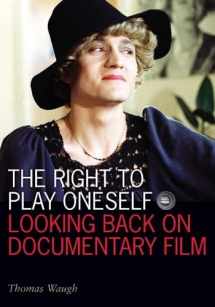
The Right to Play Oneself: Looking Back on Documentary Film (Visible Evidence)
ISBN-13:
9780816645862
ISBN-10:
0816645868
Edition:
1
Author:
Thomas Waugh
Publication date:
2011
Publisher:
Univ Of Minnesota Press
Format:
Hardcover
352 pages
FREE US shipping
Book details
ISBN-13:
9780816645862
ISBN-10:
0816645868
Edition:
1
Author:
Thomas Waugh
Publication date:
2011
Publisher:
Univ Of Minnesota Press
Format:
Hardcover
352 pages
Summary
The Right to Play Oneself: Looking Back on Documentary Film (Visible Evidence) (ISBN-13: 9780816645862 and ISBN-10: 0816645868), written by authors
Thomas Waugh, was published by Univ Of Minnesota Press in 2011.
With an overall rating of 4.0 stars, it's a notable title among other
books. You can easily purchase or rent The Right to Play Oneself: Looking Back on Documentary Film (Visible Evidence) (Hardcover) from BooksRun,
along with many other new and used
books
and textbooks.
And, if you're looking to sell your copy, our current buyback offer is $0.3.
Description
The Right to Play Oneself collects for the first time Thomas Waugh’s essays on the politics, history, and aesthetics of documentary film, written between 1974 and 2008. The title, inspired by Walter Benjamin’s and Joris Ivens’s manifestos of “committed” documentary from the 19 0s, reflects the book’s theme of the political potential of documentary for representing the democratic performance of citizens and artists.Waugh analyzes an eclectic international selection of films and issues from the 1920s to the present day. The essays provide a transcultural focus, moving from documentaries of the industrialized societies of North America and Europe to those of 1980s India and addressing such canonical directors as Dziga Vertov, Emile de Antonio, Barbara Hammer, Rosa von Praunheim, and Anand Patwardhan. Woven through the volume is the relationship of the documentary with the history of the Left, including discussions of LGBT documentary pioneers and the firebrand collectives that changed the history of documentary, such as Challenge for Change and ACT UP’s Women’s Collective. Together with the introduction by the author, Waugh’s essays advance a defiantly and persuasively personal point of view on the history and significance of documentary film.


We would LOVE it if you could help us and other readers by reviewing the book
Book review

Congratulations! We have received your book review.
{user}
{createdAt}
by {truncated_author}


